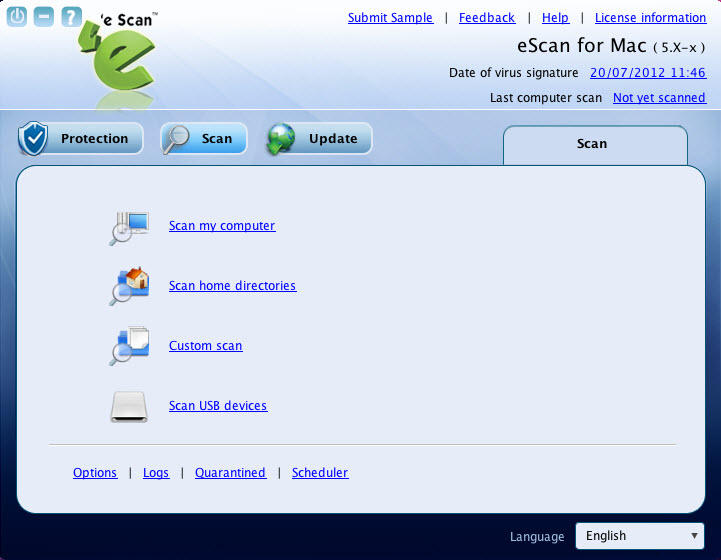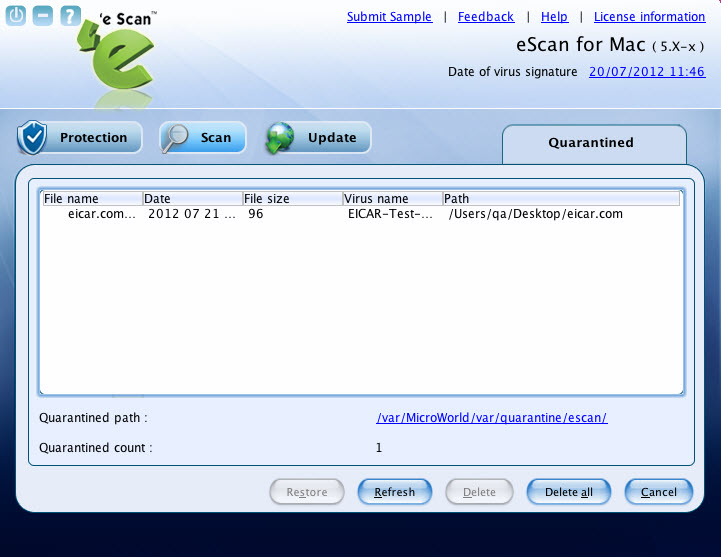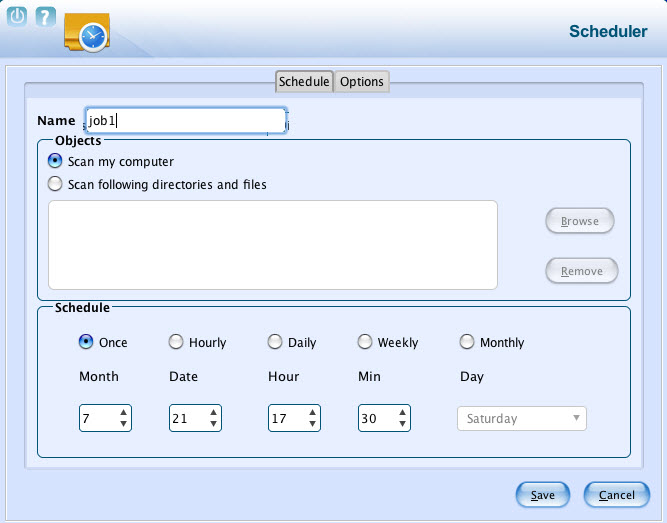From eScan Wiki
(Difference between revisions)
| Revision as of 02:53, 20 November 2012 Webmktg (Talk | contribs) (→<b> Scan </b>) ← Previous diff |
Current revision Webmktg (Talk | contribs) (→<b> Scan </b>) |
||
| Line 101: | Line 101: | ||
| | style="border-style: solid; border:"1"; border-width: 1px" width="336" align="left" valign="center" | | | style="border-style: solid; border:"1"; border-width: 1px" width="336" align="left" valign="center" | | ||
| Select this check box if you want eScan to check for unusual sequence(s), pattern(s), or content. | Select this check box if you want eScan to check for unusual sequence(s), pattern(s), or content. | ||
| - | Click the [[Image:Exclude icon.jpg]] icon and then click the <b>Browse</b> button to select the directories and files that you want to exclude. | ||
| |- bgcolor="#ffffff" | |- bgcolor="#ffffff" | ||
| | style="border-style: solid; border:"1"; border-width: 1px" width="300" align="left" valign=top | <font face="Arial"> '''Cross file system'''</font> | | style="border-style: solid; border:"1"; border-width: 1px" width="300" align="left" valign=top | <font face="Arial"> '''Cross file system'''</font> | ||
Current revision
| · eScan · MailScan · Technologies | · Technical Info · Security Awareness · User Guides |
[edit]
eScan Anti-Virus Security for Mac Version 5.x Online Help
Contents |
[edit]
Scan
The Scan module helps you to perform on-demand scanning on the selected files/directories, home directories, and my computer. Apart from system scanning, you can scan all the connected USB’s and CD-ROM devices, through auto and manual scan feature. You have various options to set for eScan to take action when any viruses are detected. The logs of scanning can be located at a specific location with a level of log you want to view. You can quarantine the suspected or infected files, and also perform real-time monitoring on files and reports.
Click this module, to access the scan screen. On the screen, you can configure the following settings:
- [edit]
Scan Options:
- [edit]
Scan My Computer:
Click this link, if you want to scan the entire system. - [edit]
Scan home directories:
Click this link, if you want to scan all files and folders of home directories of the logged in user. - [edit]
Custom Scan:
Click this link, if you want to scan specific files/ directories. - [edit]
Scan USB devices:
Click this link, if you want to scan any specific USB storage devices like Pen drive, CD-ROM device, and so on. Automatic scanning of the USB storage devices, as and when it is connected and mounted, is always active by default.
- [edit]
Additional Options:
- [edit]
Options:
- This option helps you configure scan settings for virus detection.
- On the Options tab, specify the following field details.
- Click the Save button.
The settings get saved.
- [edit]
Logs:
- Click this link, if you want to view and delete the scan log. It displays log list of the scanned files with file name, date, and file size.
- [edit]
Quarantined:
- Click this link, if you want to view and delete the infected files. You can also restore the deleted files, if needed. It displays the list of infected files that have been quarantined with file name, date, file size, and virus name. It also displays the path where quarantined files are saved with number of quarantined files.
- [edit]
Scheduler:
- The scheduler module helps you to perform scanning on local hard disk drives and selected directories and files on a schedule month, date, hour, minute, and day. Under Options window, you have various options to set for eScan to take action when any viruses are detected.
- This module is available only for administrator, but a normal user can also access and configure the scheduler settings by logging on as an administrator. It displays the list of scheduled tasks to be executed at a specific time. Click this module, to schedule the tasks for scanning. You can also edit, delete, or purge the scheduled tasks. With Delete button, you can delete any scheduled task, but Purge button is meant only for outdated schedules, wherein if you click Purge button outdated schedules get automatically deleted.
- Note: The*Schedule(s) outdated displayed at the lower-left corner of the window indicates the outdated schedules. The schedules, which are run only once, are called outdated schedules.
- When you click Add task button, the following two tabs appear:
- Schedule:
- It helps you to scan local hard disk drives and selected directories/files. When you select Scan my computer option, eScan scans the entire system. If you want to scan only specific directories and files, click the Scan following directories and files option, and then click the Browse button to select the directories and files of your choice.
- You can schedule the month, date, hour, minute, and day, on which you want to run the task.
- Options:
- It helps you to set an action to be taken by eScan when any virus is detected. Under Settings section, select appropriate check boxes, on which you want to perform scanning.








